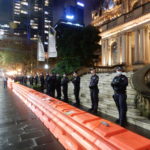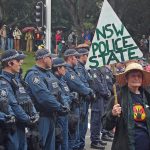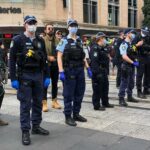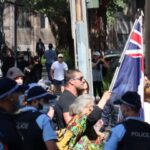NSW Government Is Imprisoning Its Opponents: Shoebridge on New Anti-Protest Laws
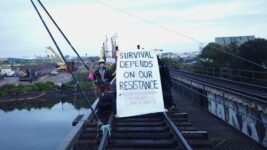
The five days of strategic and targeted actions that Blockade Australia activists carried out last week, at chokepoints providing access to the nation’s largest container facility, saw climate defenders successfully hit the fossil fuel industry where it’s most effective: its profit margin.
The Perrottet government started having convulsions. Blocking public traffic is an annoyance, but putting a halt to corporate traffic is one of the deadliest sins that can be perpetrated under a government that’s captured by industry and taking its key cues from the prosperity gospel.
Three days into the mobilisation, the Coalition took the only course it knows how when civilians are mobilising effectively in order to spark a reasonable response to curb rising extreme weather events that would also impact its corporate cronies, which is to pass harsher anti-protest laws.
NSW metropolitan roads minister Natalie Ward expanded a law last Thursday – via a practice known as delegated legislating, which bypasses the need for a parliamentary vote – so from now on similar climate actions involving bridges trigger sanctions of up to 2 years in gaol and/or a $22,000 fine.
Acting NSW premier Paul Toole further announced that his government will be drafting legislation so that the Ward-amended law, contained under section 144G of the Roads Act 1993 (NSW), can also be broadened to include roads, and transport and industrial facilities.
Silencing the emergency
“This is extreme overreach from the NSW Coalition and a serious attack upon the right to protest, which is a fundamental liberty in a democratic system like ours,” said NSW Greens MLC David Shoebridge. “This is about punishing people for protesting gross climate inaction.”
“None of these changes give police additional powers to open up roads or clear anybody who is blockading,” he continued. “The police already have well and truly sufficient powers to clear a protest.”
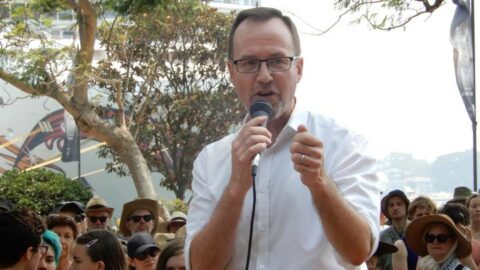
On the day that the law was changed, NSW police established Strikeforce Guard, which was supposed to nab climate activists before they carried out more actions.
Yet, the steep fines and the increased policing did nothing to halt Blockade Australia, as it continued its disruptions right through to Saturday as planned.
This mirrored a similar scenario when the climate group undertook a series of direct actions targeting the Newcastle Coal Port in November, where despite then police commissioner Mick Fuller stating an old offence carrying a maximum of 25 years would be utilised, the activists kept going.
“If you wanted a clear demonstration of how politically-motivated this is,” Shoebridge told Sydney Criminal Lawyers, “we can recall the far more disruptive and far more aggressive protests against the lockdowns from the right of politics, which saw none of this reaction from the government.”
Habit-forming
The last half decade has seen the NSW Coalition pass other draconian anti-protest laws. After promising the mining industry that he’d be cracking down on climate activists in 2014, then premier Mike Baird delivered on this pledge when he passed his Interference Amendment Bill 2016.
“The Coalition has form when it comes to criminalising protests”, advised Shoebridge.
The Greens MLC pointed to the “politically-motivated” 2016 amendments that extended a seven-year penalty so that it applies to interfering with all fossil fuel facilities, and it further created an aggravated trespass offence carrying up to a $5,500 fine.
Former premier Gladys Berejiklian couldn’t help herself either. She made more reforms to the aggravated trespass law, contained in section 4B of the Inclosed Lands Protection Act 1901 (NSW), so if it’s applied to animal activists on agricultural land it carries up to three years and a $22,000 fine.
“We should be extremely wary of and highly concerned by any government – whatever its political strips – that wants to put its opponents in gaol,” Shoebridge warned.
“That’s what these new laws are proposing. And that’s why we’ll be doing all we can to prevent them from coming into effect.”
Deporting dissent
Not one to be left out, federal immigration minister Alex Hawke leapt into action last Thursday, to announce that he’d be cancelling the visas of two German nationals who’d been involved in the Blockade Australia actions, so they could be deported back to their country of origin.
While it’s unclear whether the Germans were residents, Hawke used the powers under section 116 of the Migration Act 1958 (Cth) to deport them on “good order” grounds.
Since then immigration minister Scott Morrison changed migration laws in late 2014, thousands of long-term residents have been deported often over minor crimes.
“The abuse of immigration powers to punish people by removing them from the country has been a clear political tactic from the Coalition,” said Shoebridge, who’s the NSW Senate candidate for the Australian Greens. And he added that “extrajudicial punishment” should have no place here.
“This is using administrative powers to provide punishment that in many cases is far greater than would be handed down by the courts,” the NSW Greens justice spokesperson continued.
“We’ve seen people who identify as Australian, who have Australian families including children, being deported.”
Bleak planet
Blockade Australia spokesperson Emma was one of the activists who continued to carry out “strategic and targeted” actions at Port Botany, after state authorities turned up the heat. And she explained on Monday that a series of Sydney actions commencing on 27 June will be going ahead.
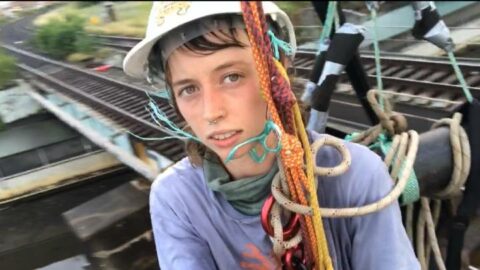
The activist said that with mounting extreme weather events, climate defenders have no choice but to act. And this is even though the judiciary is starting to hand down custodial sentences in response, as was witnessed this week, when one demonstrator was slapped with four months gaol.
This sentiment was further underscored by Shoebridge as he pointed out that young people are simply watching state and federal governments sell out their futures.
Climate scientists are warning that we must keep temperatures below a 1.5°C rise on pre-industrial levels. If we pass 2°C, its likely impacts will be compounded and spiral out of control. Yet a post-COP26 report stated that at current rates we’re heading towards a 2.4°C rise.
“What’s deeply disturbing about the government’s response here is, it may well be an indication of where we’re going in the future,” Shoebridge said in conclusion. “Instead of listening to demands, we’re going down an authoritarian crackdown path”, which increases “as the climate worsens”.
“In many ways, this is the first skirmish in what may well be a battle for some of our long-standing fundamental freedoms.”




